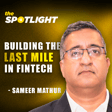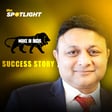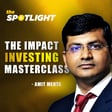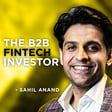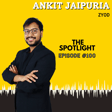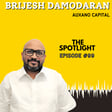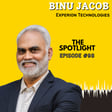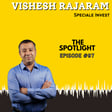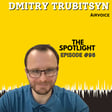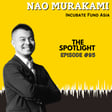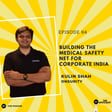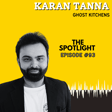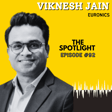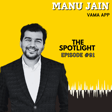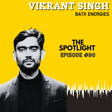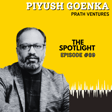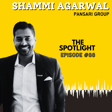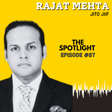Become a Creator today!Start creating today - Share your story with the world!
Start for free
00:00:00
00:00:01

Building the comfort wear brand for men | Yogesh Kabra @ XYXX Apparels
XYXX Apparels is among the most well-funded innerwear startups, having raised more than 30 million dollars to date. Yogesh talks about the market opportunity in the innerwear space and the long-term vision he is chasing.
Don’t miss:-
- Fallacy of building consumer brands
- Theory of naming XYXX
- Customer acquisition strategy
- Learnings as a founder
Transcript
Introduction and Overview
00:00:00
Speaker
I'm Yuvesh. I run XYXX. It's a new age men's dinner and loungewear brand. I run it out of Bombay. Excited to talk to you guys.
00:00:24
Speaker
InAware is no longer under Kibat as this is apparent from the fact that D2C brands selling InAware are attracting amazing investor interest and customer love. In this episode, your host Akshay Dutt is talking with Yogesh Khabra, the founder of the D2C InAware startup XYXX.
00:00:41
Speaker
XYXX is among the most well-funded innerwear startups, having raised more than $30 million till date from a whole host of amazing investors.
Market Opportunities and Vision
00:00:50
Speaker
In this conversation, Yokeesh talks about the market opportunity in the innerwear space, his journey of building XYXX and the long-term vision he is chasing. Stay tuned and follow The Founder Thesis Podcast on any audio streaming app to build your inner strength and learn from the best.
00:01:13
Speaker
I was working there for a while and I was also having one of my cousins and in the entire process of sitting in the U.S. etc. I figured Kian, the best founders there were focused on solving a consumer problem.
00:01:38
Speaker
and met some of the covert people I was hanging out with, extremely successful, were solving a consumer problem. Most of them were using technology to solve it. Not all, a lot of them were creating categories, non-tech, but they could solve it. And that approach stuck to me, he could solve the value creation, which therefore assists
00:02:07
Speaker
this proportionate group. And I was never worried about, I don't know a belief, probably because it comes out of my relationship with my father, but I always knew that I didn't have to worry about a successful outcome.
00:02:29
Speaker
That was the approach to where there was nothing to lose in the way I approached.
Consumer Insights and Innovations
00:02:35
Speaker
Tell me about your journey of finding a problem to solve. One of you realized in the USK, you need to find a problem to solve. By the way, I had 24. I had a job that used to pay extremely well. I didn't have a student loan to pay.
00:02:55
Speaker
And I was in the US, right? Now imagine I was living a very good life, but I somehow could not visualize myself solving anything meaningful there. I grew up in Tehdu, India. My schooling till 6-7 standard happened in a school which was almost in the video because
00:03:22
Speaker
My dad was still scaling up. So it was a journey step by step. You've made that journey, you've realised how many problems we've had. We've grown up in a different sort of world altogether. So when I say problems, I think it's the best. I mean, all of that was fine.
00:03:55
Speaker
I took a very immediate decision, because I always worried, if I continue doing that, the money is so attractive that you will never have the courage to leave that money and that lifestyle to go back.
00:04:09
Speaker
to get that disproportionate value, no?
00:04:24
Speaker
And I jumped. And luckily, I didn't have to worry about the job because I was working in my family business earlier. So I said, I also understood that because I want to find a problem, doesn't mean the problem will find me. Okay.
00:04:48
Speaker
So I said, you're natural. I mean, let me live my life. I have a job problem. And when you're 24, 25, boss, then the part idea, right. And I used to reject her all of them. And then I happened. I went to buy undies and the experience works. I couldn't really.
00:05:14
Speaker
If you don't know what is happening in the country, the consumer's choices are divorced by nature. Either you have a chauffeur or a backseat. Women wear the same brand.
00:05:31
Speaker
It doesn't happen in any other category. By the way, the shirt is very different. Father of Arvains has four brands selling shirt, Allen's only Twitter, England, Van Hoofs and Louis Felix. Four different sort of code of consumers.
Product Development and Strategy
00:05:47
Speaker
Wait, pause, pause, pause, pause, pause, pause, pause, pause, pause, pause, pause, pause, pause, pause, pause, pause, pause, pause, pause, pause, pause, pause, pause, pause, pause, pause, pause, pause, pause, pause, pause, pause, pause, pause, pause, pause, pause, pause, pause, pause, pause, pause, pause, pause, pause, pause, pause, pause, pause, pause, pause, pause, pause, pause, pause, pause, pause, pause, pause, pause, pause, pause, pause, pause, pause, pause, pause, pause, pause, pause, pause, pause, pause, pause, pause, pause, pause, pause, pause, pause, pause, pause, pause, pause, pause
00:05:59
Speaker
that in this 200 to 400 rupee price point that has dominating and I wouldn't I wouldn't list the least level there is a biggest consumer choice is a liberty the guy driving versus the guy sitting on the back versus the both their kids will have different pilot will have different pay paying propensity will approach the category very different
00:06:23
Speaker
Then I thought there is a giant big opportunity to create the Sunday. I am coming to the next side.
00:06:44
Speaker
And then I realized that I am not going to do anything like that. So this was just the first part, right? And then I was pretty convinced that I am not going to do anything like that. And at that point, some of the e-commerce dealers had taken off in a big way. So I got the courage that I can
00:07:10
Speaker
make inexpensive mistakes. But the thesis of e-com was you don't need a lot of miles, you don't need a lot of people, you can reach the consumer directly and you can fail fast and even cheaper. And I said, can I fail home? By the way, that's also extremely different in the US. People have gorged failure very differently.
00:07:38
Speaker
So these are the learnings that I had from my MBA. But you learn how that country or how that cohort of people approach.
00:07:57
Speaker
Unfortunately, I have more than required young people around failing. But still the mindset around failing in India is not my job. Because if I had a social sort of red, we are conservative. Our parents are conservative.
00:08:31
Speaker
And they are coming from a good place. They want a secure life, because most people don't have enough savings. And therefore, the boss was immediately coming. He should have enough to have a decent life. It is what our parents were optimized for.
00:08:50
Speaker
The US is very good. I see that increasing in India. But the US was much better even then. Again, something I learned there. Extremely insightful couple of years, couple of years there. Right to win, discover. I was very clear that the consumer will not switch.
00:09:20
Speaker
If you get it's not honestly you might not be wearing ex fights underwear, but you're not jumping out of your chair saying uncomfortable uncomfortable uncomfortable uncomfortable. So what we are offering is basically a mass upgrade to your existing experience. That doesn't mean you have a problem with your existing experience.
00:09:43
Speaker
So, then we said that massive upgrade has to be very clear, value prop care and has to be at the right price. Because, per capita is lower than Bangladesh. I don't know, we recently sold well for the total lower.
00:10:03
Speaker
So to build a large business in this country, you had to be available at the right price points. So that's the policy of building consumer brands in India is we saw most founders come from a very different background and therefore they tried to build for the background. They come from, which is very small mark. So I was very clear. So what are the problems of cutting?
00:10:30
Speaker
or a vehicle product that has a clear right to win in the category. And therefore, when you put my product and someone else's product in the category leader's product, you have to make a decision about what is the price of the product. And honestly, that's what works for us. So how did you create the product? Did you work with some contract manufacturers? What did you do to make it better?
00:10:59
Speaker
There initially, I mean, there was, historically, there are two types of one. A-fabric is a petrochemical by-product, which is last nylon, polyester. Dusterize is a natural, which is cotton, sally. And then there is a third generation of fiber called cellulosic fibers.
00:11:27
Speaker
Now, Cellulosic is very new to the world. It's much more advanced in terms of technology. It uses plant protein to make fibres, which are eventually converted into fab. What's an example of Cellulosic? It's more like Linen. Linen is more common. Your head will give you closer. It's more like parts. Your head will give you back. Head is like Linen.
00:11:55
Speaker
Thus, the product which we made was 3 times softer than cotton was naturally more moisture absorbing which what does it mean?
00:12:25
Speaker
I've got much naturally anti-vacuum, more moisture absorbent and 3 times softer, 3. So, the first use case for this fabric was baby diapers.
00:12:40
Speaker
There were many, many German, Japanese, like Parathite. There was a lot of jobs in the US for the girls. Those were the first Tuesdays. Second was sanitary pads. Again, softer, more absorbent, etc. And I was monitoring this fiber for a very long time. And I found it never long. It is perfectly perfect.
00:13:08
Speaker
And that's how I kept to this side. Initially, though, I used to call technicians from Austria. They used to come, sit with me at the room, and then we went to supply chain around it. But that again comes from my passion of textile. I'm extremely passionate about this. And your background, family connections.
00:13:27
Speaker
I was passionate about early education. It's just a thing of passion that irrespective of anything, I just enjoy doing it. So the first productive launch was essentially an underwear made of cellulose.
Scaling and Expansion Challenges
00:13:49
Speaker
The USB was cellulose that made it softer. The USB is moisture absorbency.
00:13:57
Speaker
What's your expectation from your underdogs? So, the USP is comfort, right? Which is assisted in your software. So, obviously, more comfortable. The USP is comfort because the moisture absorbs anti-vacuum and that's what you require from your basic underdogs.
00:14:22
Speaker
And then all the designs with the whole programming, how the category was positioned, etc. That also had to change both how it looks and how it feels are two important characteristics. And what gave you the confidence to do it as a full-time thing? Did you see great response?
00:14:50
Speaker
It's almost enigmatic. It was a core belief that the consumer would want. So even if my product did not work, I wouldn't have left the category. I would have tried something else. Because this core belief here, the brand
00:15:15
Speaker
because the consumer palette is different. But the people who have similar choices are black, blue, navy, shivi, agar and especially the younger generation. Especially the Huttian below, the digital sphere of influence is now global. Because they are not just following the Indian Bollywood
00:15:40
Speaker
sort of celebrities, which was the case where the previous set of render built.
00:15:54
Speaker
and the brand needs to think about the country.
00:16:12
Speaker
We should design the price tag at the job. It's the first choice that you make every day. And the last government that goes out. The functionality and appearance subconsciously play a fair amount in your work. And just as your ability to afford or pay increases, why will you settle for a mediocre product?
00:16:40
Speaker
How does it matter?
00:16:53
Speaker
Well, tell me some numbers that you saw, which might have made you feel like, let's do this full time. No, I think that was consumer feedback. My first consumer, Jaiish Devai, from Poona. He was around 55 at that point. Ordered from PDML, black, navy and a lime green underwear.
00:17:19
Speaker
I gave a little bit of my background, asked him to feed back. He loved it. He started recommending in a low engagement category. And then I started to see this pattern repeat.
00:17:48
Speaker
When there was one girl about a year back, we were just having a discussion and she said, we are new age. How we get this confidence? I told her the only hack to confidence is success.
00:18:10
Speaker
Success automatically gives you confidence. Success doesn't mean that it was larger than life's way. It's a small experiment. Successful way. Confidence was a success. He was recommending, he was repeating, he was buying more, getting rid of the entire old underwear wardrobe. That was a success.
00:18:38
Speaker
give me a lot of confidence and multiple such wars that were acquired digitally that I had no clue about.
00:18:49
Speaker
Not just metro, non-metro, etc. And what was it, price tag? Like, with this first towards it. There's always those sort of things. Start at 200 bucks. And like, how did you turn that experiment into a full-time business? So you ran an experiment, you got these underwears listed on e-commerce.
00:19:12
Speaker
We started selling, we knew it's working, we saw ratings reviews through the roof. Now the problem is, how do we reach more consumers? And in the pursuit to reach more consumers, we've built an entire machinery.
00:19:32
Speaker
which is digital. We are available in about 13,463 stores, I hope yesterday. And we're adding about 1000 stores every month. When young problems with the products tickle, and then how do you reach more people, digital, non-digital. And then we started to build the business around what needs to be done to reach 4K.
00:20:00
Speaker
And then this is obviously easier said than done. But her stitch like Alex struggled her. 0 to 0 to 50 lakhs garlic struggled her. 50 to 1 crore garlic. 1 to 2 crore garlic struggled her. 2 to 5 are like 5 to 10 are like that.
00:20:23
Speaker
It's been very common since first, and also I've been extremely lucky to get a support system of investors, family, friends, that is our continuously back.
00:20:39
Speaker
Okay. Got it. Okay. Still, could you like help me understand the journey through some numbers? I'm just thinking how much information is available in public. At that time, we used to sell about 100 pieces in a month. Today, we sell about
00:21:07
Speaker
more than half a million pieces every month. With the 600,000 pieces every month. We are the second largest innerwear premium innerwear brand in the country. What are the other brands? What do you define as premium innerwear? Chalky would be premium innerwear. His premium is luxury. So here, how am I going to category in my way? By the way,
00:21:37
Speaker
All the brands that have overtaken over these years, in a short 4 years, are in legacy. Who have a lot of years of legacy working for them. Bistal, Pachasal, international brand names. It's just been that belief and the consumer love.
00:22:03
Speaker
Okay. Underwear is just a product. Probably offline will be much larger than online. So, have you gone offline so far? You started with online. No, no, no, no. When I went offline, I went offline when going offline was not sexy.
00:22:28
Speaker
because you're following the consumers. And that was very clear. After straight away downing a bottle of tekmila, also read pages which industry runs the jockey franchise on books, 95% of the revenue came from offline, which is the largest brand, right?
00:23:02
Speaker
I've been working in the United States for many, many years. I've been working in the United States for many, many years. I've been working in the United States for many, many years. I've been working in the United States for many, many years. I've been working in the United States for many, many years.
00:23:44
Speaker
And then there's the venture capital. I'm already an average person, nothing out of the ordinary. But
00:23:55
Speaker
extremely lucky. So I got an extremely cold post cheque as Thor's and Anu Chandra. I was very averse to raising capital because I didn't know what that brought. And since I didn't need the capital capital, I was the Exuberant near the Pune. But then I said I met Manu, who I think is one
00:24:22
Speaker
one of the best investors I've ever met. And then he would also be evaluating the category. And that sort of partnership obviously changed the trajectory of our growth, of our ambition. Two episodes like that, extremely lucky to get a family, there was patient and obviously for me to start something zero to one,
00:24:51
Speaker
is a vague opportunity cost because I'm already leaving something behind. I did not have to compulsory go zero to one because I had already done zero to one in my previous sort of pre-MBA. And to me, that has come here with multiple people. I'm extremely lucky with people. My co-founder, by the way, me and Sid, my co-founder, we met on LinkedIn.
00:25:21
Speaker
Extremely lucky only decisions, but my belief is they keep making them. Some stick come down. The essence is to keep that data and not over-intellectualize. You can't over-intellectualize this. You can just say, I did.
00:25:38
Speaker
Tell me, once you got that first check, how did things change after that? Had you already gone offline before that? No, no, no, no. We had it. We wanted to. We wanted to. And it was one of the key discussion points between me and Manu. He also at that point believed Kia offline even never left. And rebuild this.
00:26:03
Speaker
A lot of our money went into it and then there was COVID. So one and a half, a city comes in from a very strong offline background. That's why he came.
00:26:26
Speaker
I think it was all due credit to his analytical rigor. I think he got onto the online journey within a couple of months. We grew quite a bit during the Covid sort of. Sitting at home would have also
00:26:44
Speaker
I think more than that, the people were scared to go out to shop for non-essential. People went on to Amazon, people went on to, and a lot of brand new digital initiative in that sort of unfortunate phase. But we've been on the lucky side again, because if I were a nerd,
00:27:10
Speaker
getting married by the function in your life. If you were a travel company, a luggage company, those were tough times. But luckily, if you were on the right side, category consumption increased because we were very dominant on mine.
00:27:35
Speaker
And the last one year has been out of fine growth journey.
00:27:44
Speaker
It's not easy to scale offline. It requires a lot of discipline, a lot of teamwork, a lot of operational excellence, loosely using excellence, but operational leverage, and how to use that to ease offline. But we were able to demonstrate that.
00:28:10
Speaker
What is your split offline versus offline? 65% is off. Wow. This, by the way, is when we're the second largest in our brand on checkcard. Wow. Okay. Amazing.
Brand Building and Marketing
00:28:26
Speaker
Okay. And offline, like, how do you build an offline in this category? Do you go to like a super stock?
00:28:39
Speaker
And now we control everything is very data oriented, et cetera. So we have distributors in city distributors retailers are operated by our street street. So we exactly know because it's a tricky channel since you're responsible to make sure your display takes your drive sales stuff like that. Okay.
00:29:04
Speaker
Display is also a function of marketing. But again, let's offline marketing team.
00:29:11
Speaker
That's how the offline animal works. Okay. How did you do the branding and packaging of it? Tell me about that. Like, why the name XYXS, XYXX, what does the packaging look like? Tell me about that part of it. The container car brand is positioned for 28-year-old, upwardly mobile, fully aware, digital consumer. So everything has to be more relevant for this person.
00:29:39
Speaker
So, we can't start from the brief on making a product till delivering the experience. Subtitiously, everything has to be relevant to the PG. That's exposed to multiple brands across categories. The experience of consumer brand is only going up with every brand coming into the ecosystem.
00:30:03
Speaker
So a lot of consumer work, a lot of starts with the realisation. He was Kujvi Nejaltha. And then how do you sort of continuously air consistency and delivery of a good experience across such points. I don't think we did packaging and independently then product, then the part is the same. And then what is different brand issues of that part? The part is essentially the brand.
00:30:29
Speaker
If you look at our KL Rahul campaign that we did, it was a hugely successful campaign. And the key was to believe and trust your instinct. Play your way.
00:30:46
Speaker
which in the category, everyone is masculinity and whenever when it drops, you will get. So, it's always about peak performance. That's the category narrative. We got away from the category narrative and product innovation is the key sort of lever. Ester instinct as an emotional sort of attitude is a key lever. Look, I think the two things that
00:31:15
Speaker
A lot of Gyanis exist in the digital ecosystem, is brand and culture. I don't understand it. Everyone's reading through the sales articles or textbooks. But think about it. What is the most important test
00:31:45
Speaker
of brand and culture, it is time. Brand has to stand the test of time. Culture has to stand the test of... because of that infinite time leverage that brand gives because of the same with culture, when the culture change new and it takes time to build a culture.
00:32:15
Speaker
Just by having a fancy work-from-home policy, I don't know what the teams are doing, what is their culture and what is their brand. I don't know. So we are very early and I don't like to talk about it as well. This has what we are doing, has to live.
00:32:45
Speaker
for a long period of time and we were just at the very beginning. I hope I get to do a podcast with you now with opinions. I'm able to back on it. Today is all common sense driven. Got it. Okay. Okay.
00:33:20
Speaker
I am a member. See the strategy is every channel has a method in which the channel works. Amazon works very historically compared to other stores, works very differently compared to our alliance chains. What's the acquisition strategy? Bring the brain.
00:33:41
Speaker
So what's your customer acquisition strategy?
00:33:49
Speaker
The stores will come. Or assist with Amazon, you have to spend on performance ads. Or assist with duty, you have to be available at the right price point, distribution, feel rate. Freedom Street.
00:34:05
Speaker
But the cheapest one-size-fits-all, zero to one, acquisition strategy goes from the lower hanging, which eventually becomes super expensive performance marketing to brand to distribution.
00:34:32
Speaker
It depends on what stage are you at. I don't think Jokmi's acquisition strategy is the same as me or someone much smaller than us would ever send mail.
00:34:45
Speaker
Well, it depends on product care, price care, available look, scalar, and acquisition. A lot of places, right? And a lot of revenue streams is inexpensive in a lot of other digital type. We do stuff like say influencer marketing and stuff like that. Yeah, we do. But we don't do influencer too.
00:35:14
Speaker
Acquire consumer we do in pressure to build a brand.
00:35:20
Speaker
associated with the right people who try to not, or minimum, go to that within French. I think in French is a brilliant opportunity to build a more narrative than you do. Okay. Got it. You do all of that. Marketing makes me different. We also do ATM and we also, we also do outdoors.
00:35:47
Speaker
Everything is in the mix, but depending on the business case, the mix moves. Also the budget. That's so important. Tell me about the funding journey after that round with Madhu Chandra. That was like a seed round. We got DAG on the next round, which is again in a way, is in control of our brand investors.
00:36:09
Speaker
very patient, again Munnasib, again luck. And in the last round, we just closed, which will be announced by the time this goes live. And spirituality growth led that round with participation from every single angel and fun, every single
00:36:32
Speaker
So the existing backers mean a lot to us on participating, even the smaller rangers ones doubling down. So the last one was about five or a million.
00:36:51
Speaker
30 odd crores, this one is about 85 odd crores. About 12, 13 million. Okay. And what do you want to use these funds for? Like spending
Future Vision and Entrepreneurial Insights
00:37:02
Speaker
on marketing. Yeah, I was spending on creating more brand awareness, creating, hiring the best quality talent or making enough, making enough mull.
00:37:14
Speaker
We have a really experimentation driven culture. So we always have some side projects that we like to explore a little bit to go there, but most of it would be towards variety. Okay. Okay. So you started with the underwear. What is the number of SKUs you have now? Tell me about that.
00:37:39
Speaker
We will be surprised. We have 65 SKUs left during about 80% of our ride. And a total of 120 orders. Very lean. Still very lean for our sites.
00:37:59
Speaker
The team is similar to Jockey. Jockey has underwear, then waist and then t-shirts and then shorts and nice shoes. We are doing something very different now. We will launch the kids in our wear, boys and girls. So I don't think that... I think the biggest mistake that we could make is benchmark Jockey because...
00:38:23
Speaker
What worked for them will not work for us. We have to do things differently.
00:38:31
Speaker
So, a lot of people have to benchmark for the next job, the next Uniqlo job. But, if you try to get the next job, then you won't be able to do it. If you try to get the next Uniqlo job, then you won't be able to do it. The U.S. may come and start the Uniqlo job, but you won't be able to do it successfully. That's a new advantage. I mean...
00:38:58
Speaker
Pay enough, I get this, because I will be able to reference the image of a benchmark or an example of that. But I was trying to build that. I was trying to build that. We are trying to build excellence. I think all entrepreneurs, it's an untrable benchmark.
00:39:22
Speaker
against a particular brand. At some point, the number one innerwear brand and to build that, I will not be able to build them on their own game.
00:39:47
Speaker
I don't know. It's always easier in hindsight. The principles to navigate through which we sort of some lenses through which we look at what we're doing and consumer product innovation, design, et cetera, are some of those lenses. Again, philosophically,
00:40:14
Speaker
are guiding input metric. That's something what we see is out. Okay. Okay. Got it. Okay. How big can XYX get? What is the, like the opportunity here is market opportunity. By the way, they did invest in us. Ambition works like co-centrics.
00:40:48
Speaker
and it doesn't stop. The ambition is to build the number one brand in the category.
00:41:02
Speaker
I think it has the potential to be a billion dollars in revenue. But look, my horizon is 20 years. I don't think like people consuming media.
00:41:29
Speaker
I am very patient to be honest to the category and if you have to permanently believe in the India story, the billion dollar is the money I money. But time doesn't work like 350.
00:41:46
Speaker
How did you learn people management? You're pretty young and it's not like you've had a lot of experience. I'm old for the startup community. I'm 32. I have a 19-month-old daughter. I'm probably one of the older guys in office.
00:42:09
Speaker
People management has been again, I take ownership. It's already, I take ownership of everyone that we hire and we do it with sincerity. We have certain sort of cultural guidelines. We don't try, we try to be very honest to what we are trying to build.
00:42:35
Speaker
Well, probably someone else would be a better person. Somebody who was with me would probably give you a better answer. To me, to my A, I treat everyone like how I like to. And by the way, that applies for mistakes. For example, if you treat someone else,
00:42:59
Speaker
I always go back and say that 100% of the time it's 100% of the time it's 100% of the time it's 100% of the time it's 100% of the time it's 100% of the time it's 100% of the time it's 100% of the time it's 100% of the time it's 100% of the time it's 100% of the time it's 100% of the time it's 100% of the time it's 100% of the time it's 100% of the time it's 100% of the time it's 100% of the time it's 100% of the time it's 100% of the time it's 100% of the time it's 100% of the time it's 100% of the time it's 100% of the time it's 100% of the time it's 100% of the time it's 100% of the time it's 100% of the time it's 100% of the time it's 100% of the time it's 100% of the time it's 100% of the time it's
00:43:31
Speaker
And I fired very quickly. One of my main skill set is to figure out cancer at stage one. And they sort of fire extremely quickly. Cool part of my job as the CEO. And I was like at the liberty to pick with people alike to work. So I used it with a fail balance.
00:43:58
Speaker
What's your advice to people who are thinking of starting up? We all speak from our biases. My dad sent me to one of his friends, really successful business person.
00:44:26
Speaker
And he told me, you'll never be successful. You'll never be able to do a great job. And by the way, he didn't think of, he was coming from a very nice place. He wanted a more secure future. And he was really worried about me. But as a founder, there are certain things that you see, which no one else has seen. And that is why you get rewarded because you see it differently. And don't ask the Lord.
00:44:56
Speaker
Play your way. You are looking at it from a very different angle than Yogesh ever could.
00:45:13
Speaker
I looked at the category from a very different angle, which a lot of people like really. So the first thing is, don't let the market determine. Market believes market will always take you closer to average. That's the nature of market. The second thing is, I find a lot of people that
00:45:43
Speaker
Write and solve it in their teachers. A lot of people try to solve it with a pen and a paper. Life is more about taking an attempt than about being successful. That is an outcome.
00:46:07
Speaker
Who is our way? And first principle is common sense. That's why I tell everyone in our teams as well. Let's just do. Let's just keep doing, keep learning. As a result, because I know I'm going to do 10 things versus a normal versus someone who's going to do five things. We're not making expansiveness.
00:46:34
Speaker
We try to do a jouveau so that we are not spending too much on our experiments. Basically, you follow that every day approach, basically. You can say that, but I think, I think over-engineer neither.
00:46:55
Speaker
is key. And Joe Zada, a forecaster, Zada entrepreneurship picket up, but now only somebody requested. He was including a podcast. We have learned a little or execute. Uh,
00:47:22
Speaker
I wrote 10 letters. Eventually, we were building for the consumer. How do I say? For example, if you scroll through LinkedIn, I don't know.
00:47:51
Speaker
Every person is giving the same gift. So, it is BS for a reason.
00:48:08
Speaker
Yes sir, please follow and I will come, then they will focus through. That's my simple sort of message to anyone who's trying to build. Focus on the consumer, focus on the consumer, say you should get it out, don't worry. And optimism is probably the single most
00:48:30
Speaker
important quality that the founder needs to have, more than analytics, more than... That is why I'm running. And that optimism helps you navigate more than any other attitude, more than any other tangible skill set. Eventually, it's your mind.
00:48:57
Speaker
And that brings us to the end of this conversation. I want to ask you for a favor now. Did you like listening to the show? I'd love to hear your feedback about it. Do you have your own startup ideas? I'd love to hear them. Do you have questions for any of the guests that you heard about in the show? I'd love to get your questions and pass them on to the guests. Write to me at adatthepodium.in. That's adatthepodium.in.

